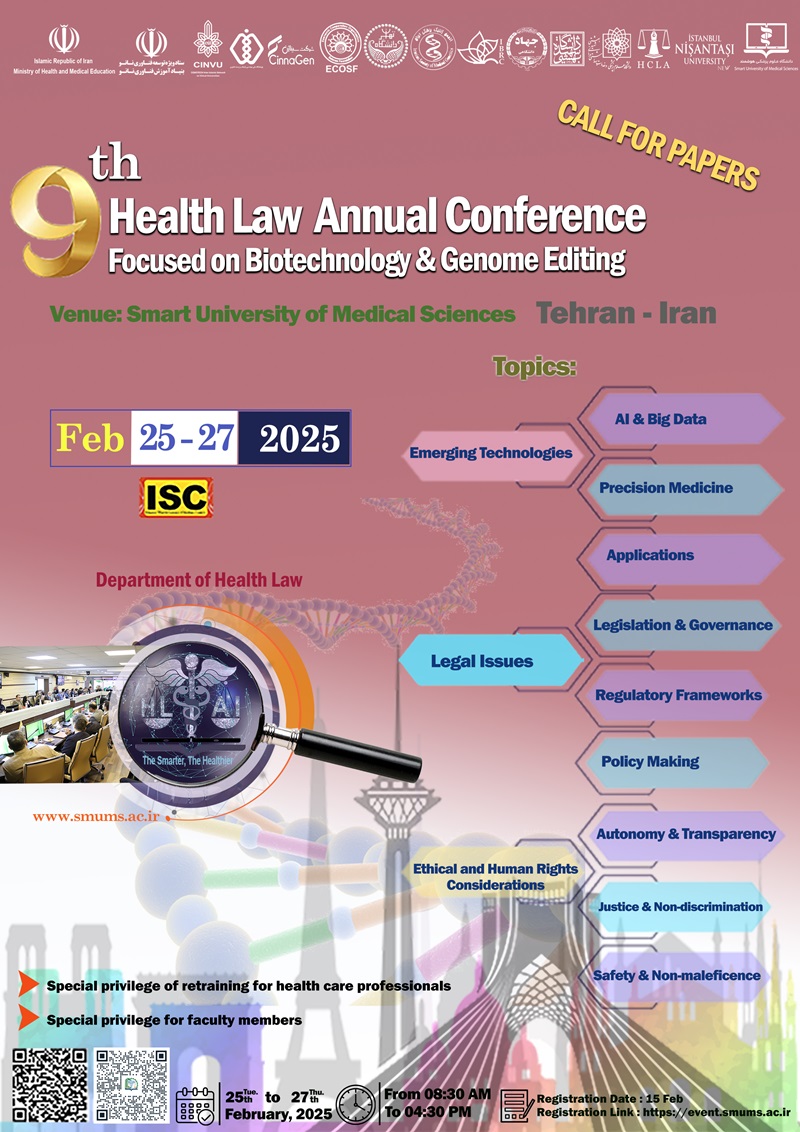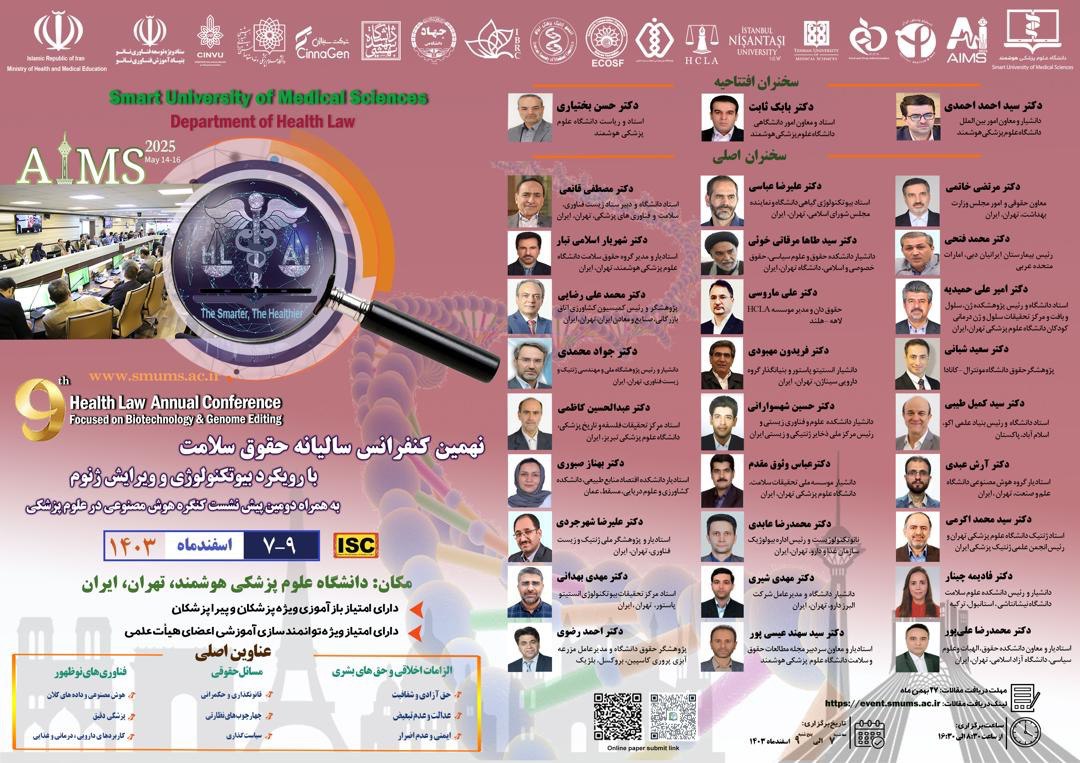
Title: The Second Pre-Event of the 2nd International Congress on Artificial Intelligence in Medical Sciences
"The Second Pre-Event of the International Congress on Artificial Intelligence in Medical Sciences, in conjunction with the Ninth Annual Conference on Health Law with a Focus on Biotechnology and Genome Editing, convened from March 7 to 9, 2025, bringing together approximately 200 distinguished experts, scholars, and researchers from the realms of law, governance, policy formulation, biotechnology, and genome editing."
This high-level forum featured keynote addresses and expert discussions led by esteemed faculty members, pioneering researchers, policymakers, and high-ranking officials from the Ministry of Health, the Food and Drug Administration, and other regulatory bodies. Additionally, renowned legal scholars, eminent jurists, and leading figures from premier scientific institutions and the biotechnology industry contributed their insights. The event also hosted distinguished academics and researchers from Canada, the Netherlands, Belgium, Turkey, Pakistan, the United Arab Emirates, and Oman, fostering a dynamic exchange of global expertise.
Over the course of three intensive days, more than 30 in-depth presentations explored critical themes spanning law, strategic governance, artificial intelligence, biotechnology, and genome editing. Over the course of this three-day conference, experts delivered more than 30 scientific presentations covering law, management, policymaking, artificial intelligence, biotechnology, and genome editing. The discussions centered on technological advancements in Iran and other countries, ethical and legal challenges, regulatory strategies, oversight mechanisms, and existing gaps, fostering in-depth analysis and knowledge exchange.
On the first day of the conference, Dr. Ghaanei, Vice President and Secretary of the Biotechnology Headquarters, recognized Smart University of Medical Sciences (SMUMS) as a key institution in addressing the pressing challenges posed by genome editing technologies. He underscored the necessity of collaboration between academic institutions and theological centers to effectively tackle the associated complexities.
In the opening keynote, Dr. Bakhtiari, President of SMUMS, reaffirmed the university’s commitment to engaging with critical scientific and health-related challenges, emphasizing a resolute approach to advancing scholarly discourse. Following this, Dr. Sabet, Vice Chancelor for Academic Affairs, elaborated on the pivotal role of artificial intelligence in aggregating and analyzing genetic interventions over the past decade, advocating for its broader application in healthcare technologies.
Dr. Hamidieh, Director of the Gene Research Institute at Tehran University of Medical Sciences (TUMS), highlighted the high costs associated with gene therapy, stressing the imperative for expanded research in biotechnology and genome editing. Meanwhile, Dr. Mohammadi, President of the National Institute of Genetic Engineering and Biotechnology, provided insights into the remarkable achievements of over 200 knowledge-based enterprises operating within the institute, reflecting significant progress in genetic engineering research.
Another key segment of the event featured Dr. Eslamitabar, Head of the Specialized Health Law Department, emphasized the interdisciplinary nature of biotechnology and genome editing and called for enhanced collaboration among experts from diverse fields.
Concluding the day’s discussions, Dr. Maraghati, a distinguished jurist and professor of law, delivered a compelling speech, presenting Islamic jurisprudential and narrative-based arguments in support of genome editing research and development. He asserted that such advancements align with ethical and religious principles, particularly in the pursuit of effective treatments for intractable diseases.
On the second day of the conference, Dr. Akrami, President of the Iranian Medical Genetics Scientific Society, underscored the critical necessity of genetic screening for identifying problematic genes. Given the legal and ethical complexities of gene therapy, he emphasized the paramount importance of effective governance, transparency, and accurate public communication. Following this, Dr. Vosough, Associate Professor, National Institute of Health Research, advocated for maximizing the utilization of legal frameworks to address health-related challenges. Additionally, Dr. Marousi, a legal expert and Director of the HCLA Institute in The Hague, highlighted the urgent need for comprehensive legal research aimed at formulating regulatory policies to manage disputes arising from emerging health technologies.
On the third and final day, Dr. Shahsavarani, Director of the National Genetic and Biological Resource Center of Iran, delivered a pivotal address on the future potential of genome editing advancements. This was followed by a robust academic discourse among leading scholars, focusing on the ethical and legal implications of genome editing and artificial intelligence applications in healthcare.
In the closing session, a consensus statement was issued, synthesizing the key findings from the presentations and submitted research papers. Participants collectively emphasized the urgent need for regulatory facilitation, legal framework development, and comprehensive policymaking in the field. It was resolved that, to raise awareness among government authorities, influential jurists, and members of parliament, a formal letter—signed by the attending scholars—would be submitted to relevant decision-makers. This document would highlight the strategic importance of biotechnology and genome editing in national healthcare, food security, pharmaceuticals, and medical treatments, while also stressing the ethical, legal, and regulatory considerations that must be addressed.
Given the growing significance of artificial intelligence in accelerating biotechnology and genome editing research, Smart University of Medical Sciences was formally designated as the central hub for AI-driven research in these domains. Participants proposed strengthening collaborative efforts between institutions such as the Pasteur Institute, the National Institute of Genetic Engineering, the National Genetic and Biological Resource Center, and major hospitals, with formal agreements and memoranda of understanding set to be established.
Throughout the conference, opportunities were also provided for networking and engagement between senior administrators of Smart University of Medical Sciences and key executives from governmental bodies, hospitals, and research institutions. Additionally, an in-depth introduction to the upcoming Second International Congress on Artificial Intelligence in Medical Sciences, scheduled for May 14-16, 2025, was presented. Scholars, researchers, and professionals in attendance were formally invited to participate in this prestigious event.
